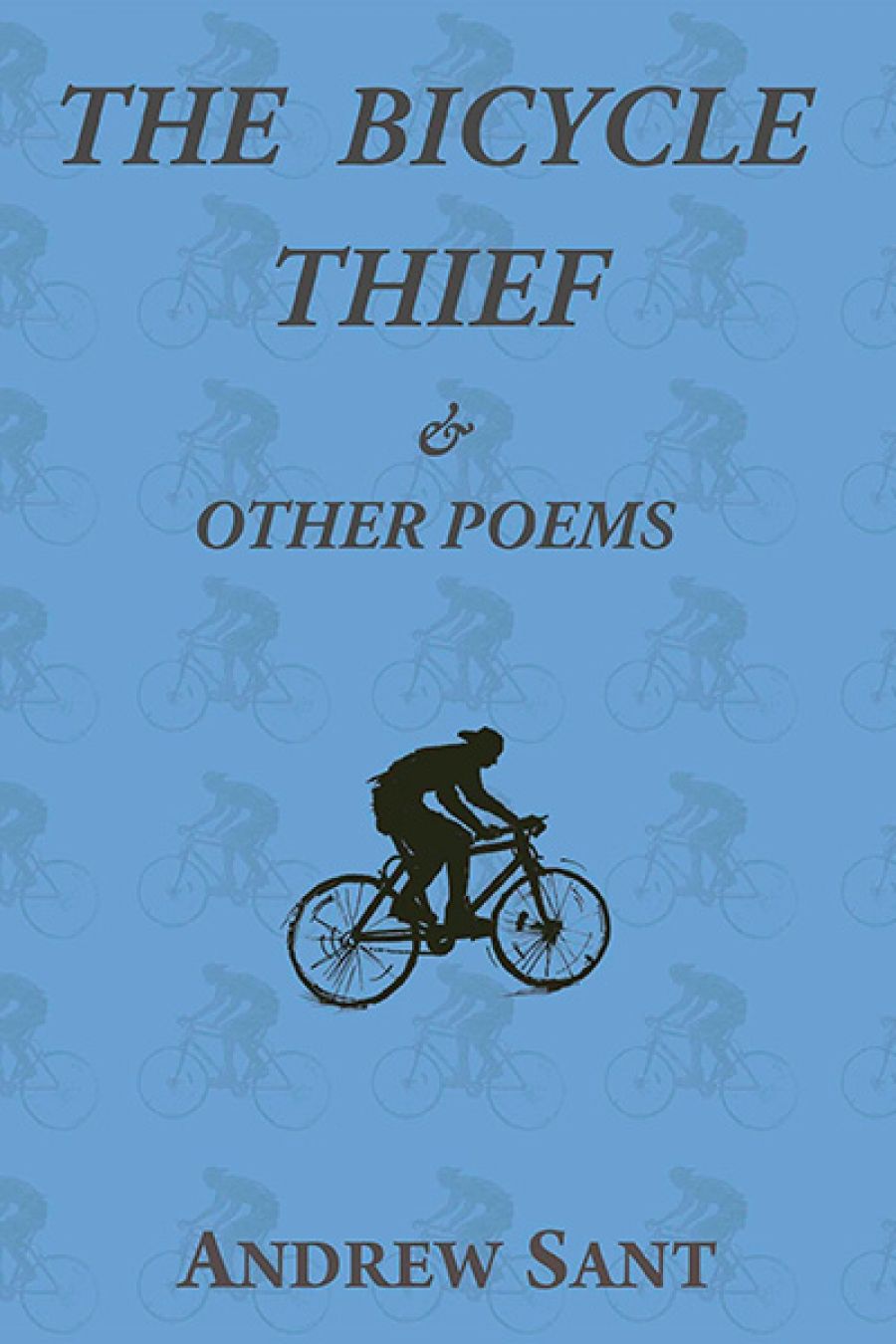
- Free Article: No
- Contents Category: Poetry
- Custom Article Title: Mystery agent
- Review Article: Yes
- Article Title: Martin Duwell reviews 'The Bicycle Thief & Other Poems' by Andrew Sant
- Online Only: No
- Custom Highlight Text:
There are some poets whose works only seem to come alive when seen in the light of their other poems. Andrew Sant may well be one of these. A Sant poem, read on its own, can often seem thoughtful but rather lightweight; embedded in one of his books, given a context by the surrounding poems, it becomes animated by a set of consistent themes and obsessions.
- Book 1 Title: The Bicycle Thief & Other Poems
- Book 1 Biblio: Black Pepper, $22.95 pb, 94 pp, 9781876044763
Take, for example, the first poem of this new book, The Bicycle Thief. ‘Lost Things’ seems initially no more than a genial look at the way everyday possessions go missing. The most that could be said for it, on a first reading, is that it works by engaging one of Western literature’s greatest themes – loss (the way heroes, loved ones, and objects all eventually pass into the dark) – and, by providing homely, domestic examples avoids the temptation of being overblown. But ‘Lost Things’ turns out to be concerned not so much with loss as with perspective. As Sant’s poem points out, nothing really gets ‘lost’; the keys, socks, umbrellas, watches of the world simply inhabit a different space. It might be true that we cannot find them, but that is our problem: ‘All those / nose down searches only concern / fresh products of perspective.’ And perspective is one of the themes that runs through this book. Another is energy, (expressed even in the titles of his two previous books, Speed & Other Liberties [2008] and Fuel [2009]) and a third is metamorphosis, another classic theme of Western poetry.
This book’s title poem appears last and, together with ‘Lost Things’, nicely brackets the rest of the poems. It is a whimsical 300-line narrative about a particular lost thing, the author’s bicycle. As with the other poems, you have to read it in the light of the whole book for it to make much sense or, at least, sustain its length.
The poem follows the stolen bicycle’s existence after the act of stealing; after, that is, the moment at which the author’s own perspective becomes irrelevant. We see how the bicycle lives on in the possession of its thief, taking him through the obsessions of his life: the girl at the chemist; the aunt and uncle who can provide some cash; the brush with the police, and so on. We feel that the energy of the bicycle’s existence somehow carries it beyond the author’s life into its own poem, where it is ready to keep a different person moving. It is all a matter of perspective, and Sant makes sure that we don’t miss these implications:
The absence, next to the wall,
was exactly the size
of my bike. So let me fill you in.
...
It is me, not him, the monkey,
who is missing from the scene ...
‘Deserter in the Counselling Room’ deals with a husband who disappears. From the perspective of the abandoned wife he is lost, but the counsellor tries to see things from the man’s perspective, whereby there is both guilt and a certain rightness in his actions. ‘Arrangements in Transit’ is a summary of all the attractions of travel to an inveterate traveller, a reminder that travelling is a controlled kind of becoming lost, involving the jettisoning of all possessions apart from the essential – the ‘nomad’s weight’.
The other poems of the book usually embody one or more of these interests: energy, change, perspective. In ‘Postcard to Hamburg’, a ‘lost’ stamped postcard is popped into a letterbox so that it will arrive to the amazement of the sender. It is suggested that this will seem an example of those quantum-physics paradoxes whereby an object will be in two places at once, but the author’s real interest is in the way in which he, the finder and poster, becomes an absent ‘mystery agent’.
‘Beating the Chinese’ describes, on the surface, how the author, harnessing his energy, does well at table tennis against Chinese who are waiting for the announcement of the site of the 2008 Olympics. But it finishes by dwelling not on insubstantial table-tennis balls but on the wrecking balls that will soon, harnessing the same energy, demolish suburbs to prepare for the infrastructure.
It is no surprise that when autobiographical material emerges it appears in the form of transformed energy and speed. ‘The Motor Car’ is subtitled ‘A Personal History’ and follows the author’s numerous cars (before they are abandoned for a bicycle). ‘Speed & Other Liberties’ describes being pulled over for speeding in Iceland while needing both speed and liberty to finish the book of poems that gives its name to this poem.
Stone is another locus for Sant’s interests, and a number of poems look at it as geological process focusing on the inhuman perspectives of geological time – ‘How fleeting // and small our comprehension seems.’ ‘Mudlark’ revisits ‘Lost Things’ dealing with somebody who is ‘nose down’ among detritus. The motive is the search for objects of contemplation, granted that status because they provide tangible clues ‘to the past doings of his gene pool’. We find these solidified icons in the fossil of ‘Marine Desire’ as well as in the pebble picked up in ‘Thirroul’.
Almost all these poems can be read as homely and genial visits to the wells of conventional themes, but that doesn’t do them justice. They blossom in the context of the surrounding poems, making Andrew Sant one of those poets of whom it is better to speak of their collective poetry rather than their poems.


Comments powered by CComment